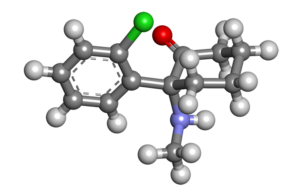
[3D model of Ketamine from Wikimedia Commons]
Ketamine continues to gain in popularity as an off-label treatment for mood disorders. During the pandemic, remote telepsychiatry companies have gained in popularity, facilitating remote prescribing of sublingual ketamine.
That practice may change on May 11, when the White House plans to end the COVID-19 public health emergency (PHE). The PHE enabled companies such as Mindbloom and Nue Life Health to offer remote ketamine prescribing, sending the dissociative anesthetic to patients’ homes.
Such programs had meteoric growth during the pandemic, when anxiety and depression rates have exploded.
The rolling back of the PHE would likely mean that the Ryan Haight Online Pharmacy Consumer Protection Act of 2008 would again go into effect, requiring new patients to have at least one in-person visit to obtain a controlled substance.
Worries about burgeoning ketamine use for mental health
Some physicians have criticized the practice of remote ketamine prescribing, which allows patients to self-administer ketamine without the presence of a medical professional available.
Last January, the American College of Clinical Pharmacology (ACCP) released two policy statements advocating for stricter use of ketamine.
An article recently published in Pharmacotherapy raised “substantial questions about both safety and effectiveness of ketamine and esketamine for psychiatric disorders.” The paper notes that little data are available on the durability of ketamine’s antidepressant effects. The paper also highlights neurotoxicity associated with ketamine or s-ketamine in animal studies.
Other studies have pointed to ketamine’s potential to be neuroprotective in some cases.
Remote ketamine prescribing safe, companies say
While ketamine has a history as a drug of abuse, companies like Mindbloom and Nue Life Health have stressed its safety when used as part of their programs. Mindbloom notes on its website that it has created a safety protocol with “a proven track record,” including more than 125,000 treatments.
An open-label study published in the Journal of Affective Disorders concluded that sublingual ketamine was a safe and effective treatment for depression. Mindbloom provided the data for the analysis.
Ketamine is an N-methyl-D-aspartate (NMDA) receptor antagonist that promotes changes in neural connections and acts on glutamate in contrast to standard antidepressants, which tend to focus on serotonin, or on serotonin and norepinephrine. A growing number of small studies have shown that ketamine can have rapid, short-term effects on symptoms of depression and anxiety.